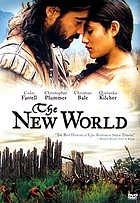Is It Available?
Review
The New World
Terrence Malick
The first time I watched this movie, I detested it. When I heard my history professor also heap invective on the film, my own judgment as confirmed. I tired of the many long shots of Colin Farrell walking around in the woods, with the brief, rare first-person voiceover relieving the silence of each scene. And Pocahontas surely was not so easily delighted by gardens and water: is this depiction any different than Disney’s? Would I be a racist, if I believed it? It’s a pretty movie, (I thought then), but not much more.
I now think differently. Looking back, there were three qualities about this movie that rubbed me the wrong way: its quiet, its stillness, and its imaginative storytelling. That those three qualities should have been the main offenders of my taste seems strange now. On the other hand, so much of our taste in movies is conditioned by the loud, busy, and naturalistic narratives we love as Americans.
Those three elements effectively convey what was a historical fact: this country was a very different place before those two cultures, Western European and Native American, first met each other on its eastern shores. Nothing in the story directly contradicts any of the historical accounts I have heard. I am convinced now that The New World is very faithful and tells a history that no academic can. It adds and omits much; but it distorts nothing. John Smith meets Pocahontas in the New World. They fall in love and he becomes close to her tribe. Smith is respected by his English countrymen as a “man of ability,” but he is at the same time an outsider. Many of his fellows are cowards, but he has courage; they lack vision, but he has it. And yet, Smith never seems at ease with the modern civilization he is a part of, and his own moral seriousness and courage are compromised, seemingly, by the same influences that civilize him.
Pocahontas is closer to nature and possesses a gentle spirit. But the movie leaves it to the viewer to judge the origins of her good nature: it could be her spiritual life, her youth, her having just fallen in love—and yes, possibly her membership in a community that is not subjected to the stresses and corruptions of modernity. As sanguine and graceful as she is, Pocahontas is not immune from tragedy and the adaptation and change that follow it. When she is grieved by loss, she certainly loses some of the innocent confidence that she had before.
The New World is a big movie, with breathtaking shots of this country’s landscape, as wild and as slumbering as it is now. It is not a History Channel feature-length documentary, complete with the talking heads of renowned historians and extensive references to primary documents of the time. What it will do, however, is offer a compelling and faithful depiction of how these great historical figures, John Smith and Pocahontas, lived through that time, responding with their very human hearts, each with its own cultural trappings.
You could watch the movie for these reasons. You could also watch it as a way to celebrate Thanksgiving---just not after your meal, or you will fall asleep. ~ Travis Biddick, November 2014

